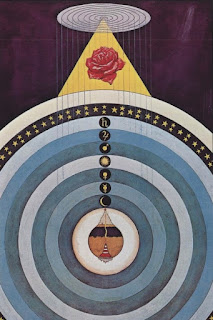The New Age Movement
The New Age Movement
The so called New Age is an amorphous movement that arose during the 1960s and 70s. The phrase ‘New Age’ is used very loosely to refer to occult or other nonmainstream religious and spiritual practices and new forms of consciousness. This New Age is based upon the belief that Earth was entering a new cycle of evolution, which would give birth to a new civilization. This is the astrological Age of Aquarius.
Marcia Moore and Mark Douglas promoted the view that, although no one knows when the Aquarian Age begins, the American Revolution, the Industrial Revolution, and the discovery of electricity are all attributable to the Aquarian Age. A common position expressed by many astrologers sees the Age of Aquarius as that time when humanity takes control of the Earth and its own destiny as its rightful heritage, with the destiny of humanity being the revelation of truth and the expansion of consciousness, and that some people will experience enlightenment in advance of others and therefore be recognized as the new leaders in the world. Another view suggests that the rise of scientific rationalism, combined with the fall of religious influence, the increasing focus on human rights since the 1780s, the exponential growth of technology, plus the advent of flight and space travel, are evidence of the dawning of the Age of Aquarius. Some may say the Age of Aquarius commenced with the moon landing in 1969.
The New Age places strong emphasis on the idea that the individual and their own experiences are the primary source of authority on spiritual matters. It exhibits "unmediated individualism", and reflects a world-view that is "radically democratic.” It places an emphasis on the freedom and autonomy of the individual. New Age religiosity is typified by its eclecticism. Generally believing that there is no one true way to pursue spirituality, New Agers develop their own worldview "by combining bits and pieces to form their own individual mix", seeking "a spirituality without borders or confining dogmas".
New Age thinking gives rise to both philosophies of Transhumanism and Deep Ecology. The New Age combined techno-optimism with the Gaia hypothesis (for instance in the case of Timothy Leary’s “star seeding” project) to provide a techno-religious rationalization for Space-Colonization-as-Evolution where we are Gaia’s brain.
The technologist Buckminster Fuller provides the main secular inspiration for the New Age movement. Fuller coined the phrase “spaceship earth” in 1951: an image of the Earth as a machine or vehicle with humans as the potential astronauts. Fuller claimed that humans are now in position to take control of the biological systems of the Earth. Engineers and computers, together with cybernetics and systems theory, will provide purely technological solutions to the world’s problems.
According to the book The Aquarian Conspiracy (1980), Pierre Teilhard de Chardin is one the most often cited thinkers of New Agers. Teilhard’s cosmic story is told principally in his book The Phenomena of Man. The end result is a “planetary culture” or “global civilization” in which humanity has full mastery of the world. This is tied deeply to the idea of progress or the belief that the destiny of humans is to transcend the natural world and natural processes. This transcendence will continue indefinitely as a way of liberating humanity from Nature’s constraints.
Teilhard’s metaphysics has its origins, like Francis Bacon’s New Atlantis, in the story of the Fall. In the Genesis story, both humans and Nature fell from grace; hence both humans and Nature are in a state of sin and in need of redemption. For Teilhard, apocalyptic despair of this world is overarched by hope of transformation of the whole of creation. Our implicit destiny in the myth of the fall, with its ramifications in the natural world, is spelled out in the myth of the restored paradise. There is undiminished hope of nature’s inclusion with the process of salvation.
We do need a new metaphysics which is genuinely not anthropocentric and mechanistic. The working out of such a metaphysics is the most important task which lies ahead for philosophy. This is the only adequate foundation for ecological concern.
Almost all societies throughout history have held that the Earth is a living organism or animal. The eclipse of this belief in the West, at the beginning of the seventeenth century, was a result of the rise of the Cartesian/Newtonian scientific worldview, which characterized the world as a machine. In the 1970s James Lovelock revives the world as organism image, which he referred to as the Gaia hypothesis. Ancient animistic views of the world as organism held that intelligence, mind, consciousness permeates the entire world animal. Teilhard’s metaphysics held to the contrary that the consciousness of the world is located almost exclusively in humans.
In 1982, Thomas Berry proposed a radical ecological revision of Teilhard’s theology, claiming that the opinion that Teilhard does not in any direct manner support the ecological mode of consciousness. Berry claims that the evolutionary process finds it highest expression in the earth community seen in its comprehensive dimensions, not simply in a human community reigning in triumphal dominion over the components of the earth community. The same evolutionary processes have produced all the living and nonliving components of the planet. The Deep Ecology position advocates a vision of humans living creatively in harmonious ecological balance with the Earth and its nonhuman inhabitants. As such, Aldo Leopold viewed humans as just “plain members” of the ecological community and as “only fellow voyagers with other creatures in the odyssey of evolution.”
Ultimately it is at a New Radical Center that we bridge the divide between Transhumanism and Deep Ecology. In the Aquarian Conspiracy, Marilyn Ferguson writes that the “Radical Center... is not neutral, not middle-of-the-road, but a view of the whole road. From this vantage point, we can see that the various schools of thought on any one issue - political or otherwise - include valuable contributions along with error and exaggeration.”




Comments
Post a Comment